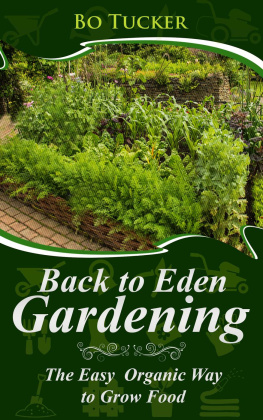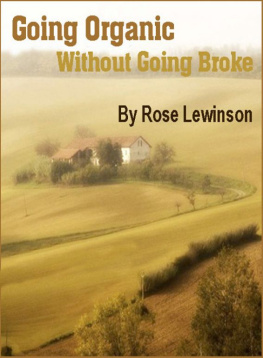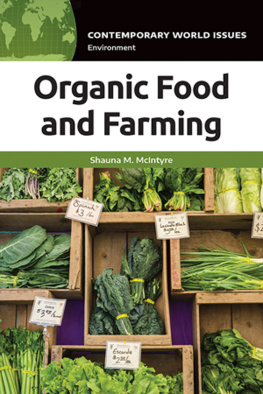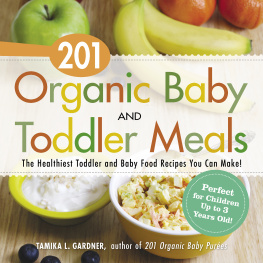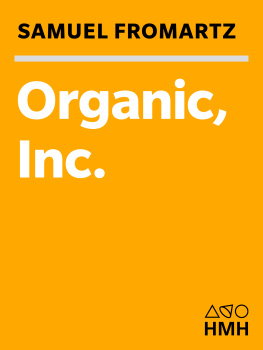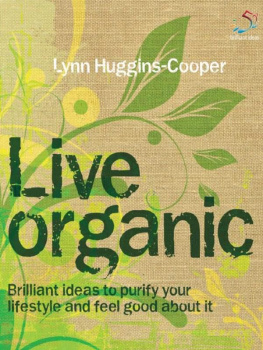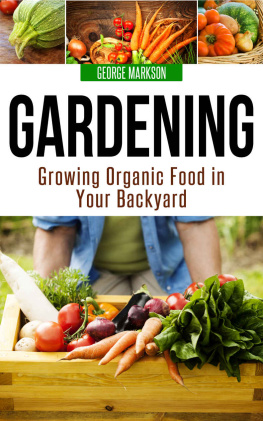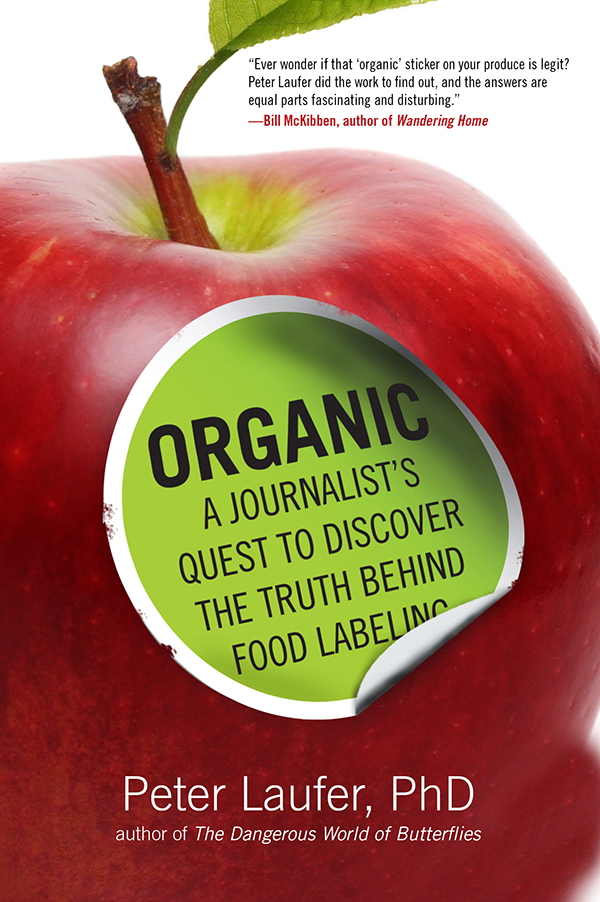Organic
A Journalists Quest to Discover the Truth behind Food Labeling
Peter Laufer, PhD
Copyright 2014 by Peter Laufer
ALL RIGHTS RESERVED. No part of this book may be reproduced or transmitted in any form by any means, electronic or mechanical, including photocopying and recording, or by any information storage and retrieval system, except as may be expressly permitted in writing from the publisher. Requests for permission should be addressed to Globe Pequot Press, Attn: Rights and Permissions Department, PO Box 480, Guilford, CT 06437.
Lyons Press is an imprint of Globe Pequot Press.
Project editor: Meredith Dias
Layout: Adam Caporiccio
Library of Congress Cataloging-in-Publication Data is available on file.
eISBN 978-1-4930-1165-0
With love to
Sheila
Who triggered my appetite for this work
with approximately 14,235 meals (and counting)
CONTENTS
Ninety percent of the diseases known to man are caused by cheap foodstuffs. You are what you eat.
from a Bridgeport (CT) Telegram advertisement for beef, perhaps where the clich was coined, 1923
In the abstract you can complain about Big Brother and how this is a program run amok, but when you actually look at the details, I think weve struck the right balance.
Barack Obama, defending hitherto secret government monitoring of citizens telephone and Internet use, 2013
There is not a crime, there is not a dodge, there is not a trick, there is not a swindle, there is not a vice which does not live by secrecy.
Joseph Pulitzer, from his mission statement for the Columbia University College of Journalism, 1903
PREFACE
Organic?
Those of us fortunate enough not to be worried about where our next meal is coming from nonetheless often act obsessed about food. We check how many calories are packed into this and how much fat (and what type) is in that. Were morbidly obese because we eat too much, and were Karen Carpenter anorexic because were worried we look too fat in those pants. We scarf up the latest fads when they promise us instant energy and long life, from nasty-tasting tough kale to magic potions of spirulina. We line up at overpriced restaurants just because some trendy reviewer showcases the eateries even while tables sit empty across the street at joints with great food. We stare dazzled at chef competitions as so-called celebrity cooks show us how to make complex dishes well never try to replicate in our own kitchens. We switch whimsically from strict vegan diets to debauched snout-to-tail pig feasts. And more and more, across America and around the globe, we seek organic groceries. Whatever the heck organic means.
I invite you, dear reader, to come with me as I chase a couple of food products produced in the Third World from my local grocery store shelves back to their point of origin, and to join me as I investigate whether we shoppers and cooks and eaters are being deceived by the seductive word organic.
Growing awareness regarding the quality, value, and safety of the food supply is fueling surging growth in the organic food industry. Giant retailers offer supermarket sections labeled organic, filled with products claiming organic status. In addition to confusion and inconsistencies with formal definitions of the word organic as it pertains to food, globalization means that distributors are bringing products to the marketplace from locales far from home, locales rife with political and business corruption.
To check the validity of food labeled organic that is grown and processed in places with histories that make this claim suspect, I embarked on a project: to trace beans and nuts from my modest kitchen back toward where they were grown and processed. This book is not a trashing of the Third World nor a condemnation of organics. I believe an organic food diet is ideal and know that the First World is also rife with corruption. I report in these pages the story of a food distributor from my own Oregon county sentenced to federal prison for committing food-labeling fraud. Skepticism is appropriate throughout the food distribution system.

This story is a quest. I want to know what this buzzword organic really means outside of the privileged culinary environs where I live, especially when it is slapped on a growing number of foodstuffsalong with price tags substantially higher than the same banana or can of beans or bag of walnuts marked with whats becoming a disparaging term: conventionalor just banana or beans or walnuts.
It seems obvious, but its worth saying: We all eat. Perhaps that explains the continuing and growing success of books about food, especially those books that help us understand what we eat and why. However, the food-oriented bookshelf does not yet deal with the pivotal and crucial issue of provenance. We rarely ascertain the origins of most organic foods we consume. That provenance is suspect at best and tainted at worst. Its time to advance the debate from Is organic better? to Is whats sold as organic really organic? We need to question the organic guarantees the marketplace promises consumers who pay premium prices for organic food, question the integrity of the organic food chain, and question the morality of sourcing high-priced organic food in locales where farmworkers and food producers labor in abusive conditions. If we are what we eat, we need to know what were eating and how it came to our dinner plates.
Annual organic food and drink sales just in the United States grew from one billion dollars in the early 1990s to about twenty-seven billion dollars in the subsequent twenty years, according to the USDA. When theres money to be made, the scam artists are never far behind.
INTRODUCTION
Nuts and Beans
My wife, Sheila, brought home a bag of walnuts from Trader Joes labeled organic, and they tasted rancid. No big deal. These things happen. I was about to take them back across town to return them to the store, but first I decided to read the label. Walnuts they were for sure, and they were organic, claimed the label. It was the small print that caught my eye: organic and a product of [dramatic pause] Kazakhstan.
Call me a skeptic and a cynic, but my journalists radar kicked in about here. As I was driving back to the store, I thought about the authoritarian regime in power in Kazakhstan, the struggling farmers over there, and the culture of bribery and corruption that lingers in most former Soviet republics. I wondered if there was anything organic about the spoiled nuts besides the word organic on the cellophane bag.
Of course Trader Joes gave me my money back. The collegiate-looking clerk and I joked about the credibility of the Kazakhstan organic food industry. I went home with a replacement bag of conventionally grown California-sourced walnuts and pretty much forgot the episode.
Fast-forward a few months, and Sheila is looking at the label of a can of organic black beans she has brought home from the Whole Foods competitor here in the college town of Eugene: Market of Choice. The brand is Natural Directions, and Sheilas worry is BPA. Shes endeavoring to keep Bisphenol A out of our household, concerned that the plastic lining in cans is a health hazard. Shes on the phone with a representative of Natural Directions who says that in order to know the type of can, it is necessary to know the origin of the product. On the top of the can is stamped Product of Bolivia.



